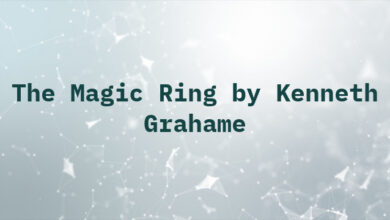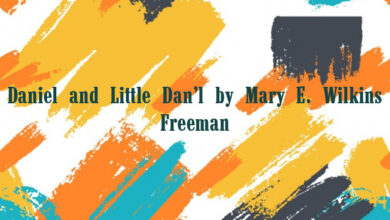
Peter Christen Asbjornsen – Grumblegizzard
Tales from the Fjeld was published in Tales from the Fjeld (1908), translated by George Webbe Dasent.
ONCE on a time there were five goodies, who were all reaping in a field; they were all childless, and all wished to have a bairn. All at once they set eyes on a strangely big goose-egg, almost as big as a man’s head.
“I saw it first,” said one.
“I saw it just as soon as you,” screamed another.
“Heaven help me, but I will have it,” swore the third; “I was the first to see it.”
So they flocked round it and squabbled so much about the egg that they were tearing one another’s hair. But at last they agreed that they would own it in common, all five of them, and each was to sit on it in turn like a goose, and so hatch the gosling. The first lay sitting eight days, and sat and sat, but nothing came of it; meanwhile the others had to drag about to find food both for themselves and her. At last one of them began to scold her.
“Well,” said the one that sat, “you did not chip the egg yourself before you could cry, not you; but this egg, I think, has something in it, for it seems to me to mumble, and this is what it says, ‘Herrings and brose, porridge and milk, all at once.’ And now you may come and sit for eight days too, and we will change and change about and get food for you.”
Tales from the Fjeld 043.jpg So when all five had sat on it eight days, the fifth heard plainly that there was a gosling in the egg, which screeched out, “Herrings and brose, porridge and milk.” So she picked a hole in it, but instead of a gosling out came a man child, and awfully ugly it was, with a big head and little body. And the first thing it bawled out when it chipped the egg was, “Herrings and brose, porridge and milk.”
So they called it “Grumblegizzard.”
Ugly as it was, they were still glad to have it, at first; but it was not long before it got so greedy that it ate up all the meat in their house. When they boiled a kettle of soup or a pot of porridge, which they thought would be enough for all six, it tossed it all down its own throat. So they would not keep it any longer.
“I’ve not known what it is to have a full meal since this changeling crept out of the egg-shell,” said one of them, and when Grumblegizzard heard all the rest were of the same mind, he said he was quite willing to be off. If they did not care for him, he didn’t care for them; and with that he strode off from the farm.
After a long time he came to a farmer’s house, which lay in a stone country, and there he asked for a place. Well, they wanted a labourer, and the goodman set him to pick up stones off the field. Yes! Grumblegizzard gathered the stones from the field, and he took them so big that there were many horse-loads in them, and whether they were big or little, he stuffed them all into his pocket. ‘Twas not long before he was done with that work, and then he wanted to know what he was to do next.
“I’ve told you to pluck out the stones from the field,” said the goodman; “you can’t be done before you begin, I trow.”
But Grumblegizzard turned out his pockets and threw the stones in a heap. Then the goodman saw that he had done his work, and felt he ought to keep a workman who was so strong. He had better come in and have something to eat, he said. Grumblegizzard thought so too, and he alone ate all that was ready for the master and mistress and for the servants, and after all he was not half full.
“That was a man and a half to work, but a fearful fellow to eat, too; there was no stopping him,” said the goodman. “Such a labourer would eat a poor farmer out of house and home before one could turn round.”
So he told him he had no more work for him. He had best be off to the king’s grange.
Then Grumblegizzard strode on to the king, and got a place at once. In the king’s grange there was enough both of work and food. He was to be odd man, and help the lasses to bring in wood and water, and other small jobs. So he asked what he was to do first.
“Oh, if you would be so good as to chop us a little firewood.”
Yes. Grumblegizzard fell to chopping and hewing till the splinters flew about him. ‘Twas not long before he had chopped up all that there was, both of firewood and timber, both planks and beams; and when he had done, he came back and asked what he was to do now.
“Go on chopping wood,” they said.
“There’s no more left to chop,” said he.
“That couldn’t be true,” said the king’s grieve, and he went and looked out in the wood-yard. But it was quite true: Grumblegizzard had chopped everything up; he had made firewood both of sawn planks and hewn beams. That was bad work the grieve said, and he told him he should not taste a morsel of food till he had gone into the forest and cut down as much timber as he had chopped up into firewood.
Grumblegizzard went off to the smithy, and got the smith to help him to make an axe of fifteen pounds of iron; and so he went into the forest and began to clear it; down toppled tall spruces and firs fit for masts. Everything went down that he found either on the king’s or his neighbour’s ground; he did not stay to top or lop them, and there they lay like so many windfalls. Then he laid a good load on a sledge, and put all the horses to it, but they could not stir the load from the spot, and when he took them by the heads and wished to set them a-going, he pulled their heads off. Then he tumbled the horses out of the traces on to the ground, and drew the load home by himself.
When he came down to the king’s grange, the king and his wood-grieve stood in the gallery to take him to task for having been so wasteful in the forest—the wood-grieve had been up to see what he was at—but when Grumblegizzard came along dragging back half a wood of timber, the king got both angry and afraid, and he thought he must be careful with him, since he was so strong.
“That I call a workman, and no mistake,” said the king; “but how much do you eat at once, for now you may well be hungry?”
“When he was to have a good meal of porridge, he could do with twelve barrels of meal,” said Grumblegizzard; “but when he had got so much inside him, he could hold out for some time.”
It took time to get the porridge boiled, and, meantime, he was to draw in a little wood for the cook; so he laid the whole pile of wood on a sledge, but when he was to get through the doorway with it, he got into a scrape again. The house was so shaken that it gave way at every joist, and he was within an ace of dragging the whole grange over on end.
When the hour drew near for dinner, they sent him out to call home the folk from the field; he bawled and bellowed so that the rocks and hills rang again; but they did not come quick enough for him, so he fell out with them, and slew twelve of them on the spot.
“He has slain twelve men,” said the king; “and he eats for twelve times twelve. But for how many do you work, I should like to know?”
“For twelve times twelve too,” said Grumblegizzard.
When he had eaten his dinner, he was to go out into the barn to thrash; so he took off the roof-tree and made a flail out of it; and when the roof was just about to fall, he took a great spruce fir, branches and all, and stuck it up for a roof-tree; and then he thrashed the floor and the straw and hay altogether. He did great harm, for the grain and chaff and beard flew about together, and a cloud arose over the whole grange.
When he was nearly done thrashing, enemies came into the land, and there was to be war. So the king told him to take folk with him and go on the way to meet the foe and fight them, for he thought they would put him to death. “No! he would have no folk with him to be slain; he would fight alone, that he would,” said Grumblegizzard.
“All the better; I shall be sooner rid of him,” said the king.
But he must have a mighty club.
They sent off to the smith to forge a club of fifty pounds. “That might do very well to crack nuts,” said Grumblegizzard. So they smithied him one of a hundred pounds. “That might do well enough to nail shoes with,” he said. Well, the smith couldn’t smithy it any bigger with all his men. So Grumblegizzard went off to the smithy himself, and forged a club of fifteen tons, and it took a hundred men to turn it on the anvil. “That might do,” said Grumblegizzard.
Besides, he must have a scrip for food; and he made one out of fifteen ox-hides, and stuffed it full of food. And so he toddled off down the hill with his scrip at his back and his club on his shoulder.
So, when he had got so far that the enemy saw him, they sent out a man to ask if he were coming against them.
“Bide a bit, till I have had my dinner,” said Grumblegizzard, as he threw himself down on the road, and fell to eating behind his great scrip.
But they couldn’t wait, and began to shoot at him at once, so that it rained and hailed rifle bullets.
“These bilberries I don’t mind a bit,” said Grumblegizzard, and fell to eating harder than ever.
Neither lead nor iron could touch him, and before him was his scrip, like a wall, and kept off the fire.
So they took to throwing shells at him, and to fire cannons at him; and he just grinned a little every time they hit him.
“Ah! ah! it’s all no good,” he said. But just then he got a bombshell right down his throat.
“Fie!” he said, and spat it out again; and then came a chain-shot and made its way into his butter-box, and another took the bit he was just going to eat from between his fingers. Then he got angry, and rose up, and took his club, and dashed it on the ground, and asked if they were going to snatch the bread out of his mouth with their bilberries, which they puffed out of big peashooters. Then he gave a few more strokes, till the rocks and hills shook, and the enemy flew into the air like chaff, and so the war was over.
When Grumblegizzard got home again and wanted more work, the king was in a sad way, for he thought he should have been rid of him that time, and now he could think of nothing but to send him to hell.
“You must be off to Old Nick, and ask for my land-tax.”
Grumblegizzard set off from the grange, with his scrip on his back and his club on his shoulder. He lost no time on the way, but when he got there, Old Nick was gone to serve on a jury. There was no one at home but his mother, and she said she had never in her born days heard talk of any land-tax; he had better come again another day.
“Yes, yes! come to me to-morrow!” said Grumblegizzard. “That’s all stuff and nonsense, for to-morrow never comes.” Now he was there, he would stay there. He must and would have the land-tax, and he had lots of time to wait.
But when he had eaten up all his food, the time hung heavy, and so he went and asked the old dame to give him the land-tax. She must pay it down.
“No,” she said, “she couldn’t do it. That stood as fast as the old fir-tree,” she said, “that grew outside the gate of hell, and was so big that fifteen men could scarcely span it when they held hands.”
But Grumblegizzard climbed up to the top of it, and twisted and turned it about like an osier; and then he asked if she were ready with the land-tax.
Yes, she dared not do anything else, and found so many pence as he thought he could carry in his scrip.
And now he started for home with the land-tax; but, as soon as he was off, Old Nick came back. When he heard that Grumblegizzard had stridden off from his house with his big scrip full of money, he first of all beat and banged his mother, and then ran after him to catch him on the way.
And he caught him up too, for he ran light, and used his wings, while Grumblegizzard had to keep to the ground under the weight of the big scrip; but, just as Old Nick was at his heels, he began to run and jump as fast as he could; and he held his club behind him to keep Old Nick off. And so they went along, Grumblegizzard holding the haft, and Old Nick clawing at the head, till they came to a deep dale; there Grumblegizzard leapt from one hill-top to the other, and Old Nick was so hot to follow, that he tripped over the club and fell down into the dale, and broke his leg, and so there he lay.
“Here you have the land-tax,” said Grumblegizzard, as he came to the king’s grange, and dashed down the scripful of money before the king, so that the whole gallery creaked and cracked.
The king thanked him, and put a good face on it, and promised him good pay and a safe pass home if he cared to have it; but all Grumblegizzard wanted was more work.
“What shall I do now?” he asked. Well, when the king had thought about it, he said he had better travel to the Hill Troll, who had carried off his grandfather’s sword to that castle he had by the lake, whither no one dared to go.
Tales from the Fjeld 054.jpg So Grumblegizzard got several loads of food into his big scrip, and set off again; and he fared both far and long, over wood and fell, and wild wastes, till he came to some high hills, where the Troll was said to dwell who had taken the king’s grandfather’s sword.
But the Troll was not to be seen under bare sky, and the hill was fast shut, so that even Grumblegizzard was not man enough to get in.
So he joined fellowship with some quarrymen, who were living at a hill farm, and who lay up there quarrying stone in those hills. Such help they never yet had, for he beat and battered the fell till the rocks were rent, and great stones were rolled down as big as houses; but when he was to rest at noon, and take out one load of food, the whole scrip was clean eaten out.
“I’m a pretty good trencherman myself,” said Grumblegizzard; “but whoever has been here, has a sharper tooth, for he has eaten up bones and all.”
That was how things went the first day, and it was no better the next. The third day he set off to quarry stones again, and took with him the third meal of food; but he lay down behind it, and shammed sleep.
Just then there came out of the hill a Troll with seven heads, and began to munch and eat his food.
“Now the board is laid, and I will eat,” said the Troll.
“That we’ll have a tussle for,” said Grumblegizzard; and gave him a blow with his club, and knocked off all his seven heads at once.
So he went into the hill, out of which the Troll had come, and in there stood a horse, which ate out of a tub of glowing coals, and at its heels stood a tub of oats.
“Why don’t you eat out of the tub of oats?” said Grumblegizzard.
“Because I am not able to turn round,” said the horse.
“I’ll soon turn you,” said he.
“Rather strike off my head,” said the horse.
“So he struck it off, and then the horse was turned into a handsome man. He said he had been taken into the hill by the Troll, and turned into a horse, and then he helped him to find the sword, which the Troll had hidden at the bottom of his bed, and upon the bed lay the Troll’s old mother, asleep and snoring.
Home again they went by water, and when they had got well out, the old witch came after them; as she could not catch them, she fell to drinking the lake dry, and she drank and drank, till the water in the lake fell; but she could not drink the sea dry, and so she burst.
When they came to shore, Grumblegizzard sent a message to the king, to come and fetch his sword. He sent four horses. No! they could not stir it; he sent eight, and he sent twelve; but the sword stayed where it was, they could not move it an inch. But Grumblegizzard took it up alone, and bore it along.
The king could not believe his eyes when he saw Grumblegizzard again; but he put a good face on it, and promised him gold and green woods; and when Grumblegizzard wanted more work, he said he had better set off for a haunted castle he had, where no one dared to be, and there he must sleep till he had built a bridge over the Sound, so that folk could pass over. If he were good to do that he would pay him well; nay, he would be glad to give him his daughter to wife.
“Yes! yes! I am good to do that,” said Grumblegizzard.
No man had ever left that castle alive; those who reached it lay there slain and torn to bits, and the king thought he should never see him more, if he only got him to go thither.
But Grumblegizzard set off; and he took with him his scrip of food, a very tough and twisted stump of a fir-tree, an axe, a wedge, and a few matches, and besides, he took the workhouse boy from the king’s grange.
When they got to the Sound, the river ran full of ice, and was as headlong as a force; but he stuck his legs fast at the bottom, and waded on till he got over at last.
When he had lighted a fire and warmed himself, and got a bit of food, he tried to sleep; but it was not long before there was such a noise and din, as though the whole castle was turned topsy-turvy. The door blew back against the wall, and he saw nothing but a gaping jaw, from the threshold up to the lintel.
“There, you have a bit—taste that!” said Grumblegizzard, as he threw the workhouse boy into the gaping maw.
“Now let me see you, what kind you are. Maybe we are old friends.”
So it was, for it was Old Nick, who was outside. Then they took to playing cards, for the Old One wanted to try and win back some of the land-tax, which Grumblegizzard had squeezed out of his mother, when he went to ask it for the king; but whichever way they cut the cards, Grumblegizzard won, for he put a cross on all the court cards, and when he had won all his ready money, Old Nick was forced to give Grumblegizzard some of the gold and silver that was in the castle.
Just as they were hard at it the fire went out, so that they could not tell one card from another.
“Now we must chop wood,” said Grumblegizzard, and with that he drove his axe into the fir-stump, and thrust the wedge in; but the gnarled root was tough, and would not split at once, however much he twisted and turned his axe.
“They say you are very strong,” he said to Old Nick; “spit in your fists and bear a hand with your claws, and rive and rend, and let me see the stuff you are made of.”
Old Nick did so, and put both his fists into the split, and strove to rend it with might and main, but, at the same time, Grumblegizzard struck the wedge out, and Old Nick was caught in a trap; and then Grumblegizzard tried his back with his axe. Old Nick begged and prayed so prettily to be let go, but Grumblegizzard was hard of hearing on that side till he gave his word never to come there again and make a noise. And so he too had to promise to build a bridge over the Sound, so that folks could pass over it at all times of the year, and it was to be ready when the ice was gone.
“This is a hard bargain,” said Old Nick. But there was no help for it, if he wished to get out. He had to give his word; only he bargained he was to have the first soul that passed over the bridge. That was to be the Sound due.
“That he should have,” said Grumblegizzard. So he got loose, and went home; but Grumblegizzard lay down to sleep, and slept till far on next day.
So when the king came to see if he was hacked to pieces or torn to bits, he had to wade through heaps of money before he could get to the bed. It lay in piles and sacks high up the wall: but Grumblegizzard lay in the bed asleep and snoring.
“God help both me and my daughter,” said the king when he saw that Grumblegizzard was alive and rich. Yes, all was good and well done; there was no gainsaying that. But it was not worth while talking of the wedding till the bridge was ready.
So one day the bridge stood ready, and Old Nick stood on it to take the toll he had bargained for.
Now Grumblegizzard wanted to take the king with him to try the bridge, but he had no mind to do that. So he got up himself on a horse, and threw the fat milkmaid from the king’s grange upon the pommel before him—she looked for all the world like a big fir-stump—and then he rode over till the bridge thundered under him.
“Where is the Sound due? Where have you put the soul?” screamed Old Nick.
“It sits inside this stump. If you want it, spit in your fists and take it,” said Grumblegizzard.
“Nay, nay! many thanks,” said Old Nick. “If she doesn’t take me, I’ll not take her. You caught me once, and you shan’t catch me again in a cleft stick;” and with that he flew off straight home to his old mother; and since then he has never been seen or heard in those parts.
But Grumblegizzard went home to the king’s grange, and wanted the wages the king had promised him; and when the king tried to wriggle out of it, and would not keep his word, Grumblegizzard said he had better pack up a good scrip of food, for he was going to take his wages himself. Yes, the king did that: and, when all was ready, Grumblegizzard took the king out before the door, and gave him a good push and sent him flying up into the air. As for the scrip, he threw it after him, that he might have something to eat. And, if he hasn’t come down again, there he is still hanging with his scrip between heaven and earth, to this very day that now is.




